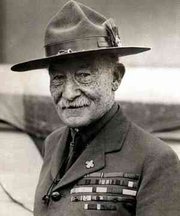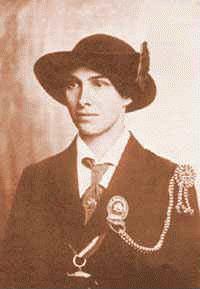Robert Baden-Powell, 1st Baron Baden-Powell
|
|
Robert Stephenson Smyth Baden-Powell, 1st Baron Baden-Powell, OM, GCMG, GCVO, KCB (February 22, 1857 – January 8, 1941) was a soldier, writer and founder of the world Scouting movement.
| Contents |
Early life
Baden-Powell was born in Paddington, London in 1857. He was the sixth of eight sons amongst ten children of a Savilian professor of geometry at Oxford. In the family and to his friends he was known as Stephe (rhymes with Livy). His father, Reverend Harry Baden-Powell died when he was three, and he was raised by his mother, Henrietta Grace, a strong woman determined her children would succeed, of whom he would say in 1933, "The whole secret of my getting on lay with my mother."
After attending Rose Hill School, Tunbridge Wells, Baden-Powell was awarded a scholarship to Charterhouse public school. His first introduction to scouting skills was stalking and cooking animals - and avoiding teachers - in the nearby woods, which were strictly out-of-bounds. He also played the piano and violin, was an ambidextrous artist of some talent, and enjoyed acting. Holidays were usually spent on yachting or canoeing expeditions with his brothers.
Military Career
In 1876, Baden-Powell joined the 13th Hussars in India. In 1895 he held special service in Africa and returned to India in 1897 to command the 5th Dragoon Guards.
Baden-Powell enhanced and honed his scouting skills amidst the Zulu tribesmen in the early 1880s in the Natal province of South Africa where his regiment had been posted and where he was mentioned in dispatches. His skills impressed his superiors and he was soon transferred to the British secret service. He frequently travelled disguised as a butterfly collector, incorporating plans of military installations into his drawings of butterfly wings.
Baden-Powell was subsequently posted for three years as intelligence officer for the Mediterranean based in Malta. He then led a successful campaign in Ashanti, Africa, and at the age of 40 was promoted to lead the 5th Dragoon Guards in 1897. A few years later he wrote a small manual, entitled "Aids to Scouting", a summary of lectures he had given on the subject of military scouting, to help train recruits. Using this and other methods he was able to train them to think independently, to use their initiative, and to survive in the wilderness.
He returned to South Africa prior to the Boer War and was engaged in a number of actions against the Zulus. Promoted by the time of the Boer War to the youngest colonel in the British army, he was responsible for the organisation of a force of frontiersmen to assist the regular army. Whilst arranging this, he was trapped in the Siege of Mafeking, and surrounded by a Boer army of in excess of 8,000 men. Although wholly outnumbered, the garrison withstood the siege for 217 days, and much of this is attributable to some of the cunning military deceptions instituted at Baden-Powell's behest as commander of the garrison. Fake minefields were planted and his soldiers were ordered to simulate avoiding (non-existent) barbed wire while moving between trenches.
Baden-Powell did most of the reconnaissance work himself and built up a team of native boys to stand guard, carry messages around the garrison for him, and also across enemy lines. Many of the boys lost their lives in this undertaking. Baden-Powell was much impressed with their courage and the equanimity with which they performed their tasks and it was later to set him to thinking. The siege was raised in the Relief of Mafeking on May 16 1900. Promoted to Major-General, Baden-Powell became a national hero.
After organising the South African Constabulary (police) he returned to England to take up a post as Inspector General of Cavalry in 1903.
Return to England
On his return, Baden-Powell found that his military training manual "Aids to Scouting" had become something of a best-seller, and was being used by teachers and youth organisations.
Following a meeting with the founder of the Boys' Brigade, Sir William Alexander Smith, Baden-Powell decided to re-write Aids to Scouting to suit a youth readership, and in 1907 held a camp on Brownsea Island for 22 boys of mixed social background to test out some of his ideas. Scouting for Boys was subsequently published in 1908 in six installments. Boys and girls spontaneously formed Scout Troops and the Scouting movement had inadvertently started, first a national, and soon an international obsession. The scouting movement was to grow up in friendly parallel relations with the Boys' Brigade. A rally for all Scouts was held at Crystal Palace in London in 1908, at which Baden-Powell discovered the first Girl Scouts. The Girl Guides movement was subsequently founded in 1910 under the auspices of Baden-Powell's sister, Agnes Baden-Powell.
Although he could doubtless have become Field Marshal, Baden Powell decided to retire from the Army in 1910 on the advice of King Edward VII, who suggested that he could better serve his country by promoting Scouting.
In January 1912 Baden-Powell met his future wife Olave Soames on an ocean liner (Arcadia) on the way to New York to start one of his Scouting World Tours. She was a young woman of 23, he 55, and they shared the same birthday. They became engaged in September of the same year, causing a media sensation. To avoid press intrusion, they married in secret on October 30, 1912. It is said that Baden-Powell, who never had any other adventures with women, opted for this late marriage to a woman young enough to be his daughter in order to deflect persistent rumours about his pederasty. See discussion belowThe Scouts of England each donated a penny to buy B-P a wedding gift - a Rolls Royce.
World War I and later events
On the outbreak of World War I in 1914, Baden-Powell put himself at the disposal of the War Office. No command, however, was given him, for, as Lord Kitchener said: "he could lay his hand on several competent divisional generals but could find no one who could carry on the invaluable work of the Boy Scouts." It was widely rumoured that Baden-Powell was engaged in spying, and intelligence officers took great care to foster and inculcate the myth.
Baden-Powell was made a Baronet in 1922, and was created Baron Baden-Powell, of Gilwell in the County of Essex, in 1929, Gilwell Park being the International Scout Leader training centre. He was appointed to the Order of Merit of the British honours system in 1937, and was also awarded 28 decorations from foreign states.
In a short verse he wrote, he mischievously described how to pronounce his surname:
- Man, Nation, Maiden
- Please call it Baden.
- Further, for Powell
- Rhyme it with Noël.
Under his dedicated command the world Scouting movement grew. By 1922 there were more than a million scouts in 32 countries; by 1939 the number of scouts was in excess of 3.3 million.
The Baden-Powells had three children - one son and two daughters (who gained the courtesy titles of Honourable in 1929; the son later succeeding his father in 1941):
- Peter, later 2nd Baron Baden-Powell (1913-1962) and
- Hon. Heather Baden-Powell (1915-1986), and
- Hon. Betty Baden-Powell (1917-2004) who married 1936 Gervase Charles Robert Clay (b. 1912, and had issue 3 sons and 1 daughter)
Soon after he had married, Baden-Powell had begun to have problems with his health, suffering several bouts of illness. He complained of persistent headaches, which were considered by his doctor to be of psychosomatic origin and treated with dream analysis. The headaches subsided upon his ceasing to sleep with Olave and moving into a makeshift bedroom set up on his balcony. In 1934 his prostate was removed, and in 1939 he moved to a house he had commissioned in Kenya, a country he had previously visited to recuperate. He died and is buried in Kenya, at Nyeri, near Mount Kenya, on January 8, 1941.
Scouts and Guides mark February 22 as "Founder's Day" (Scouts) and "Thinking Day" (Guides), the joint birthdays of Robert and Olave Baden-Powell, to remember and celebrate the work of the Chief Scout and Chief Guide of the World.
On his interest in boys
Two modern biographers of Baden-Powell consider him to have been a repressed homosexual, Michael Rosenthal of Columbia University and Tim Jeal. Tim Jeal's work, researched over the span of five years, was published by Yale University Press and well reviewed by the New York Times, the Washington Post and other publications of record.
Along with many other pieces of evidence for his contention, Jeal mentions as illustrative an episode which ocurred in November of 1919. While on a visit to Charterhouse, his old public school, he stayed with an old friend, A. H. Tod, a bachelor teacher and housemaster who had taken large numbers of nude photographs of his pupils as part of a photographic record of public school life. Baden-Powell's diary entry about his stay reads: "Stayed with Tod. Tod's photos of naked boys and trees. Excellent." In a subsequent communication to Tod regarding starting up a Scout troop at the school, Baden-Powell mentions his impending return visit and adds: "Possibly I might get a further look at those wonderful photographs of yours." Tod's pictures of nude boys survived until the 1960's, when they were destroyed in order to "protect Tod's reputation." We are told, however (by R. Jenkyns), that the album contained nude boys in poses which were "contrived and artificial." Though today such a thing may raise suspicions, seen in the light of those days these would not have been at all unusual. We have no reason to suspect that Tod's relations were anything but chaste, and his pictures were rather in keeping with the contemporary tradition of male homoerotic art exemplified by Henry Scott Tuke's paintings, Baron Wilhelm von Gloeden's photography, and others.
Jeal also mentions that Baden-Powell ". . . consistently praised the male body when naked and denigrated the female. At Gilwell Park, the Scouts' camping ground in Epping Forest, he always enjoyed watching the boys swimming naked, and would sometimes chat with them after they had just 'stripped off.'" (Personal communications between Jeal and old scouts)
Despite his appreciation for the beauty of young boys, Baden-Powell seems never to have acted on his suspected attraction with any of the boys, and was adamant about the need to restrain the sexual impulse, especially in his communications with boys. He incorporated a graphic prohibition against masturbation in early scouting manuals (so graphic that Cox, his printer, refused to run the presses till the mention was watered down), and into his eighties carried on correspondences with individual scouts exhorting them to control their urge for "self-abuse." He subscribed to the commonly held turn-of-the-century opinion that the practice led to disease, madness and sexual impotence. His views were not shared by all. Dr. F. W. W. Griffin, editor of The Scouter, wrote in 1930 in a book for Rover Scouts that the temptation to masturbate was "a quite natural stage of development" and steered scouts to a text by H. Havelock Ellis that held that "the effort to achieve complete abstinence was a very serious error." (Tim Jeal, Baden-Powell: Founder of the Boy Scouts 1989, pp. 93-94)
Messages
References
- Robert Baden-Powell "Scouting for Boys", London, 1907
- Hilary Saint George Saunders, "The Left Handshake", London, 1948
- William Hillcourt (with Olave, Lady Baden-Powell) "Baden-Powell, Two Lives Of A Hero", Putnam, 1964
- Tim Jeal "Baden-Powell, Founder of the Boy Scouts", London, 1989
Succession
| Preceded by: New Creation | Baron Baden-Powell | Succeeded by: Arthur Baden-Powell |
da:Robert Baden-Powell de:Robert Baden-Powell es:Robert Baden-Powell eo:Robert BADEN-POWELL fr:Robert Baden-Powell it:Robert Baden-Powell ms:Robert Baden-Powell nl:Robert Baden-Powell ja:ベーデン・パウエル no:Robert Baden-Powell pl:Robert Baden-Powell pt:Baden-Powell sl:Robert Baden-Powell sv:Robert Baden-Powell


